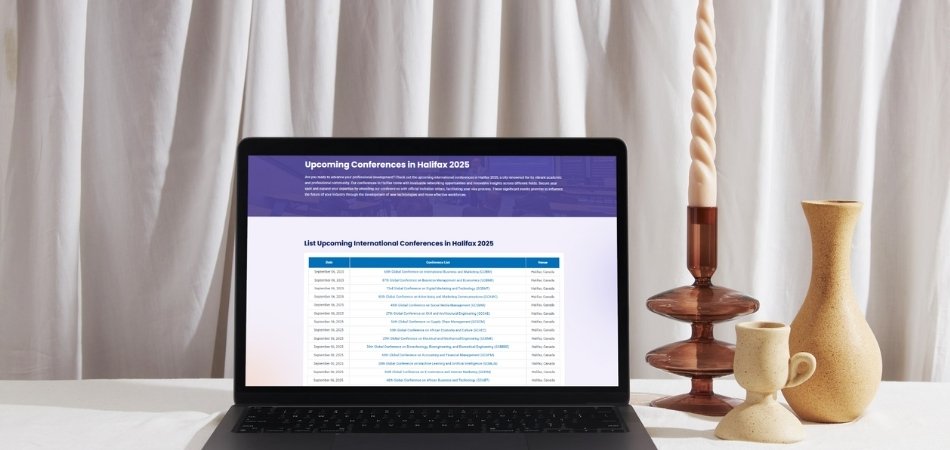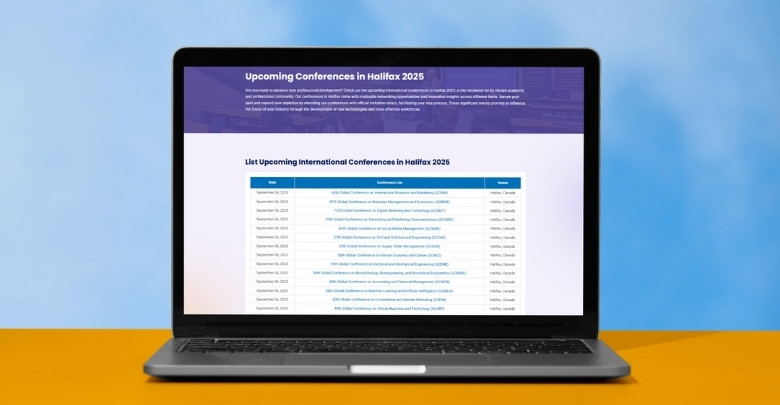As one of Canada’s most vibrant and active cities, Halifax is an ideal conference destination for networking, learning, and professional development. But with so many events to choose from, it can be challenging to determine which one will truly benefit your career. This leads to a common question: How Do I Choose the Right Conference to Attend in Halifax?
To choose the right conference to attend in Halifax, consider your goals, industry relevance, speakers, networking opportunities, and location. Check reviews, agendas, and past events to ensure value. Prioritize conferences that align with your career growth, learning needs, and professional connections for a meaningful experience.
Want to know more about selecting the right conference for your goals? Check out the full article for more information and tips on how to make the best decision.
How Do I Choose the Right Conference to Attend in Halifax? Step-by-step instructions
When choosing a conference in Halifax, it’s important to take some time to consider the important factors. By choosing the right fit, you can expand your knowledge and network. Use this step-by-step procedure to make an informed decision and get the most out of your conference attendance.

Step 1: Identify Your Purpose and Goals
Clarify what you want to achieve by attending a conference. Whether it’s gaining industry insights, networking with experts, or exploring new trends, defining your objectives helps narrow your choices. Consider what value the event will add to your career or business. A well-defined purpose ensures a more fulfilling experience.
Step 2: Research Industry-Relevant Conferences
Look for events that align with your profession or interests. Explore speaker lineups, session topics, and key discussions to ensure they match your learning goals. Industry-specific conferences provide better insights and connections. Verify past editions for quality and attendee feedback.
Step 3: Evaluate the Speakers and Agenda
Check if the conference features renowned speakers or industry leaders. A strong lineup of experts can provide valuable insights and networking opportunities. Review the agenda to see if the sessions cover relevant and timely topics. A well-structured program enhances learning and engagement.
Step 4: Consider Location, Venue, and Accessibility
Ensure the conference venue is convenient and accessible. Factor in travel, accommodation, and transportation options before making a decision. A well-located event saves time and enhances the overall experience. Comfortable facilities and amenities contribute to a productive stay.
Step 5: Assess Networking and Engagement Opportunities
Look for events that offer networking sessions, workshops, or panel discussions. Interactive opportunities help in building valuable connections and exchanging ideas. Many upcoming conferences in Halifax provide structured networking to facilitate meaningful professional relationships. Engaging with attendees and speakers can open new career prospects.
Step 6: Check Reviews and Past Attendee Experiences
Research feedback from previous attendees to gauge the conference’s credibility. Reviews and testimonials offer insights into the event’s organization and value. A well-reviewed conference is more likely to provide a worthwhile experience. Avoid events with consistently negative feedback or poor management.
Step 7: Compare Registration Fees and Benefits
Analyze the cost of attending versus the value offered. Some conferences include exclusive access to workshops, digital materials, or networking sessions. Weigh the benefits of each ticket tier before finalizing your registration. A good investment should enhance your knowledge and career prospects.
Step 8: Plan Ahead and Register Early
Once you’ve selected a suitable event, secure your spot early. Early registration often provides discounts and better access to key sessions. Planning your schedule in advance ensures a smooth and hassle-free experience. Being well-prepared allows you to maximize your time at the conference.
Do You Need to Meet Specific Criteria to Attend a Conference?
Yes, specific criteria may apply depending on the conference type and industry. Some events are open to everyone, while others require certain qualifications. Reviewing event guidelines helps you understand if any restrictions exist before registering for a conference.
Many professional conferences require attendees to have industry experience or relevant credentials. Some academic events may ask for research submissions or institutional affiliations. Checking the eligibility for attending conferences ensures you meet any necessary requirements before making plans to participate.
Public conferences, networking events, and trade shows are usually open to all interested individuals. Some exclusive gatherings may require invitations, memberships, or prior approval. Being familiar with the event’s entry conditions helps you choose the right conference without unexpected restrictions.
Small vs. Large Conferences in Halifax: Which Is Better for You?
Choosing between small and large conferences in Halifax depends on your personal preferences, goals, and the type of experience you’re looking for. Each offers unique advantages and challenges. The following table highlights key differences to help you decide which is the best fit for you.
| Factor | Small Conferences | Large Conferences |
| Networking Opportunities | More intimate, fostering deeper connections. | Wider network with more diverse connections. |
| Event Size | Smaller with fewer participants. | Large-scale events with thousands of attendees. |
| Personal Interaction | Easier to interact with speakers and attendees. | Less personal, with larger groups and sessions. |
| Content Depth | Often more focused and niche-specific. | Broader content covering multiple areas of interest. |
| Cost | Generally more affordable. | Higher registration fees due to scale and amenities. |
| Flexibility | Greater flexibility in schedule and event formats. | Less flexibility, with fixed schedules and large sessions. |
| Audience Type | Often attracts a specialized audience. | Attracts a mix of professionals from various sectors. |
| Exposure | Limited exposure to industry leaders or large brands. | Offers exposure to major companies, brands, and influencers. |
| Conference Atmosphere | More relaxed, with informal settings and smaller rooms. | Fast-paced and often crowded with limited personal space. |
| Learning Experience | More interactive with hands-on sessions or workshops. | Focused on keynote speeches, seminars, and panel discussions. |
Is Finding the Right Conference in Halifax a Complicated Process?
No, finding the right conference in Halifax doesn’t have to be complicated. With the right approach, you can easily find suitable events. Being aware of your goals and interests can help narrow down options and make the process much smoother.
Researching conference options is key to making an informed choice. While searching for conferences to attend, consider factors like topics, speakers, and networking opportunities. Look for events with relevant content and a lineup that meets your professional or personal needs. Checking event details ensures the conference aligns with your expectations and interests.
Planning ahead makes the process smoother and less stressful. Registering early secures your spot, often at discounted rates, and avoids last-minute challenges. A well-planned approach not only ensures you choose the right event but also helps you prepare for a rewarding experience.
How to Set Goals for Attending a Conference in Halifax?
Setting clear goals before attending a conference in Halifax is essential for making the most of the experience. Whether you’re there to learn, network, or explore new ideas, goals guide your actions. Here’s how to set meaningful goals for your conference attendance:
Define Your Purpose
Start by identifying why you want to attend the conference. Whether it’s gaining knowledge or expanding your network, knowing your purpose is key. With a clear purpose, you can stay focused during the event. It helps make the experience more productive and impactful.
Identify Key Learning Areas
Consider what specific topics or skills you want to improve. Prioritize the sessions or workshops that align with your goals. This allows you to focus on areas that will benefit your professional development. Stay attentive to new trends or insights in your field.
Set Networking Goals
Think about the professionals or collaborators you want to meet. Have a plan for how to engage with them, whether through networking events or casual conversations. Setting goals for meaningful connections ensures you leave the conference with valuable relationships. Networking opens doors for future opportunities and collaborations.
Plan Your Time Wisely
With multiple sessions available, it’s important to schedule wisely. Choose the ones that match your goals and avoid overwhelming yourself. Make sure you allow time for breaks to refresh and network. Efficient time management ensures you don’t miss out on valuable experiences.
Set Actionable Post-Conference Goals
Consider how you’ll apply what you’ve learned after the event. Whether following up with contacts or implementing new strategies, actionable goals keep you engaged. Make plans to integrate new ideas into your daily work. This step ensures your conference experience has a lasting impact.
Evaluate Your Progress
After the conference, take time to assess if your goals were met. Reflect on what you learned and whom you connected with. This evaluation helps you understand your achievements and areas for improvement. It also guides your preparation for future events.
What to Do If a Conference You Choose Doesn’t Meet Expectations?
Sometimes, conferences don’t meet our expectations despite careful planning. It’s important to handle this situation effectively to maximize the value you can still get. Here’s what you can do if you find yourself in this situation at a conference:
Assess What Went Wrong
Take a moment to identify what caused the disappointment. Was it the content, networking opportunities, or speakers? Reflecting on this can help you decide how to make the most of the situation. Knowing the issue allows you to adjust your expectations and focus.
Adjust Your Schedule
If the conference isn’t offering what you hoped, change your focus. Attend different sessions that might provide more value. Consider stepping outside your comfort zone by trying something new. This can lead to unexpected insights or connections that you wouldn’t have anticipated.
Network With Other Attendees
Even if the sessions aren’t meeting your expectations, networking can still provide valuable experiences. Engage with other attendees who might offer insights or suggestions. Use this opportunity to build connections that could benefit you in the future. Networking can make a less-than-ideal conference more worthwhile.
Look for Side Events
Many conferences offer additional events such as meetups or workshops. These side events can sometimes provide a more intimate and engaging experience. Attend these smaller gatherings to make the most of your time. Exploring these options may open new doors for learning and networking.
Make Use of Available Resources
Make use of other conference resources even if the sessions aren’t impressive. Look for materials, handouts, or online content provided by the event. These resources may offer additional insights that the conference didn’t cover during sessions. Make sure you take full advantage of what’s available.
Reflect and Learn for Future Conferences
After the conference ends, reflect on what could have been improved. What can you do differently when choosing conferences in the future? This experience helps you set better expectations and avoid similar situations next time. Learning from your disappointment prepares you for better event choices moving forward.
FAQs About How Do I Choose the Right Conference to Attend in Halifax?
Conferences in Halifax can be valuable experiences, but choosing the right one can be difficult. Listed below are answers to frequently asked questions to guide your decision-making process and help you select an event that meets your needs.
What Are the Benefits of Attending a Conference in Halifax?
Networking, industry insights, and skills development are all available at Halifax conferences. You can connect with professionals, learn from experts, and gain exposure to new trends. Conferences also allow you to exchange ideas, enhance your career prospects, and stay updated on industry advancements. Choosing the right event ensures you maximize these benefits.
How Can I Determine If a Conference Is Worth Attending?
Researching a conference’s past editions, speakers, and agenda helps determine its value. Look for attendee reviews, testimonials, and event structure to assess its impact. Ensure the sessions align with your learning goals and networking expectations. A well-organized and reputable event is more likely to offer a valuable experience.
What Are Some Common Mistakes People Make When Choosing a Conference?
A common mistake is attending a conference without clear goals or expectations. Many also overlook researching past events and speakers, leading to disappointment. Not considering travel logistics and costs can create unexpected challenges. A well-thought-out selection process helps avoid these pitfalls and ensures a valuable experience.
How Can I Maximize My Learning Experience at a Conference?
Prepare in advance by researching speakers and session topics. Actively participate in discussions, ask questions, and take notes for future reference. Engage in post-session networking to gain deeper insights. Reviewing and applying what you’ve learned ensures long-term benefits from the conference.
What Role Do Conference Sponsors Play in Event Quality?
Sponsors can influence the quality and credibility of a conference. Well-known sponsors often support high-quality events with experienced speakers and valuable resources. Checking the list of sponsors and partners can help you assess the event’s legitimacy. A well-funded event usually provides a better overall experience.
What Should I Do If a Conference Gets Canceled or Postponed?
Check the event’s official announcements for updates on refunds or rescheduling. Look for alternative conferences covering similar topics or online sessions. If flights or accommodation were booked, see if they offer cancellation options. Staying informed ensures you minimize disruptions and adjust your plans accordingly.
Bottom Line
When choosing a conference in Halifax, be sure to consider your goals, interests, and professional needs. Considering factors such as industry relevancy, speaker quality, and networking opportunities will help you answer the question, “How do I choose the right conference to attend in Halifax?”. To ensure alignment with your objectives, research the event’s agenda, past attendees, and location. It’s also essential to evaluate the costs and benefits of registration to ensure a valuable return on investment.
By preparing properly, you can select a conference that offers significant opportunities for growth, learning, and connection, ultimately benefiting your career or personal development.







